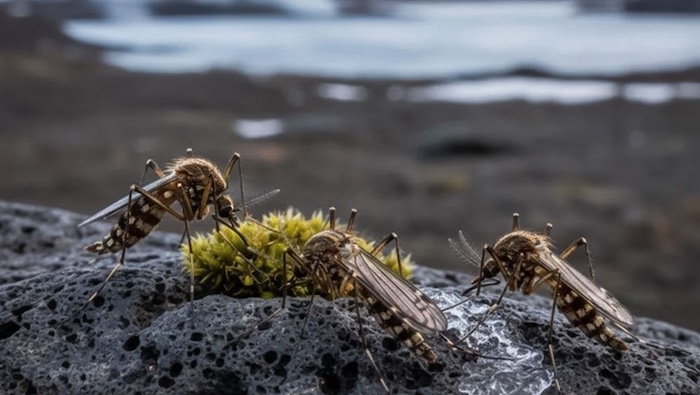
Mosquitoes have been discovered in Iceland for the first time, following record-breaking heat that scientists say could signal environmental changes in the country’s fragile ecosystem.
Insect enthusiast Bjorn Hjaltason found the mosquitoes over several nights last week while using wine-soaked ropes to observe moths, local media reported.
Mr Hjaltason captured two female mosquitoes and one male, which were later confirmed to be Culiseta annulata one of the few species capable of surviving winter.
Before the discovery, Iceland was one of only two mosquito-free zones in the world, alongside Antarctica, largely due to its cold climate.
The mosquitoes were found in Kjós, a glacial valley southwest of the capital, Reykjavik. Hjaltason shared the discovery on a Facebook page for local wildlife, describing “a strange fly on a red wine ribbon,” according to Icelandic media.
“I could tell right away that this was something I had never seen before,” he said in the post, adding, “the last fortress seems to have fallen.”
The insects were sent to the Icelandic Institute of Natural History, where entomologist Matthías Alfreðsson confirmed the identification. He told CNN the species is common in parts of Europe and North Africa, but it remains unclear how they reached Iceland.
Iceland’s historically cold climate and limited stagnant water have long prevented mosquitoes from breeding, according to the World Population Review. But the country has recently experienced multiple record temperature highs.
Typically, Iceland rarely exceeds 20°C in May, with heatwaves lasting no more than two or three days. However, this year, temperatures surpassed that threshold for 10 consecutive days across various regions. The country also recorded its hottest ever May day, reaching 26.6°C at Eglisstaðir Airport.
A June study by the Global Heat Health Information Network warned that such temperature shifts could have “significant” impacts on delicate ecosystems adapted to cold climates.
Last year was the world’s hottest on record, and the UN’s climate body has affirmed that human activity has “unequivocally” warmed the atmosphere, oceans, and land.
Alfreðsson said further monitoring will be needed next spring to determine if the mosquito species has “truly become established in Iceland.”
Speculating on how the insects arrived, Hjaltason said, “One always suspects Grundartangi – it’s only about six kilometres from me, and things often arrive with ships and containers, so it’s possible something came in that way.”
“But if three of them came straight into my garden, there were probably more,” he added.
Faridah Abdulkadiri



